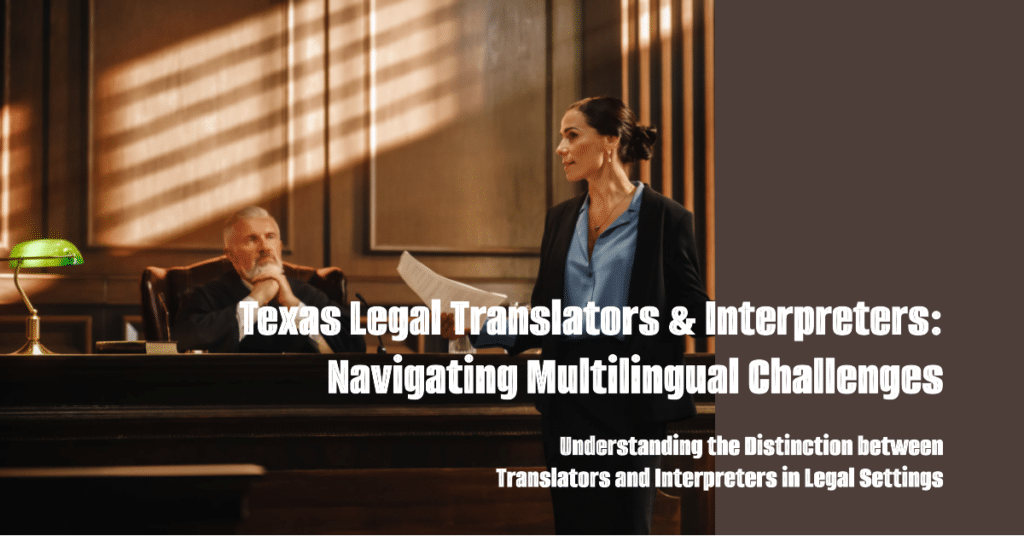
In the vast and diverse state of Texas, legal professionals frequently require language services for various judicial matters, such as depositions, family law, and immigration court. In these situations, it’s crucial to understand the distinction between translators and interpreters. Translators work with written text, while interpreters deal with spoken words or sign languages. This article will compare and contrast translators and interpreters in terms of their roles, skills, training, certification, and equipment, highlighting their essential contributions to the legal system in Texas.
Roles of Translators and Interpreters
Translators and interpreters play distinct roles in legal settings, as demonstrated through examples from Texas courts and laws. Translators convert written documents, such as contracts, evidence, and transcripts, from one language to another. They need to convey the style, tone, and intent of the text while considering cultural and dialectal differences. In some cases, they may need to retain elements of the source language culture in the target language translation, depending on the document’s purpose and audience.
On the other hand, interpreters convert spoken communication, such as testimony, arguments, and instructions, from one language to another. They must communicate the meaning and context of the speech while considering cultural and dialectal differences. They may also need to adapt their speech to the level and style of the speaker and listener.
Comparing translators and interpreters, they differ in terms of response times, directionality, accuracy, confidentiality, and ethics. While translators have more time to work on a text, interpreters must respond immediately to spoken communication. Both professions require accuracy and confidentiality, but their ethical considerations may vary.

Skills of Translators and Interpreters
To perform their jobs effectively, translators and interpreters need specific skills. Translators must have excellent writing skills in both source and target languages, as well as research skills to find reliable sources and terminology. Additionally, they need attention to detail, analytical skills, cultural awareness, and time management skills.
Interpreters, however, must have excellent speaking and listening skills in both source and target languages, as well as memory skills to retain information and context. They also need intercultural communication skills, public speaking skills, critical thinking skills, and stress management skills.
Specialization, proficiency level, quality assurance, and feedback mechanisms differ between translators and interpreters. Some professionals may specialize in particular fields, while others work as generalists. Quality assurance methods and feedback mechanisms vary between individual translators and interpreters and the organizations they work for.
Training of Translators and Interpreters
Translators and interpreters acquire their knowledge and skills through various means. Translators may have a degree or certificate in translation studies or a related field, or they may have learned through self-study or experience. They may also take continuing education courses or workshops to update their skills and knowledge.
Similarly, interpreters may have a degree or certificate in interpreting studies or a related field, or they may have learned through self-study or experience. They may also take continuing education courses or workshops to update their skills and knowledge.
In terms of formal education requirements, professional development opportunities, accreditation options, and career paths, translators and interpreters differ, but both professions offer a wide range of opportunities for growth and advancement.
Certification of Translators and Interpreters
To demonstrate their competence and credibility, translators and interpreters may obtain certifications from various organizations. Translators may obtain certification from organizations such as the American Translators Association (ATA), the International Federation of Translators (FIT), the National Association of Judiciary Interpreters and Translators (NAJIT), or the International Association of Professional Translators and Interpreters (IAPTI).
Interpreters may obtain certification from organizations such as the Certification Commission for Healthcare Interpreters (CCHI), the International Association of Conference Interpreters (AIIC), NAJIT, or IAPTI. In Texas, interpreters working in state courts must be certified by the Judicial Branch Certification Commission (JBCC), which offers three levels of certification: basic (for municipal courts), master (for county courts), and master licensed court interpreter (for district courts). They must pass written and oral exams, as well as a criminal background check, to obtain certification.
Certification requirements, benefits, challenges, and renewal processes differ between translators and interpreters, but both professions can benefit from certification in terms of credibility and professional growth.
Are interpreters Born or Made?
Interpreting is a unique skill that not everyone possesses. As previously mentioned, interpreters must have excellent speaking and listening skills in both source and target languages, as well as memory skills to retain information and context. They also need intercultural communication skills, public speaking skills, critical thinking skills, and stress management skills. While some argue that great interpreters are born with natural talents, others believe that interpreters can be trained and developed through formal education and practice.
In legal settings, interpreters must be able to navigate multilingual challenges in various judicial matters, such as depositions, family law, and immigration court. Texas legal professionals often require language services, and it’s crucial to understand the difference between translators and interpreters. Translators convert written documents from one language to another, while interpreters convert spoken communication from one language to another. Each role requires specific skills and equipment to perform the job effectively.
When selecting and admitting candidates to interpreting programs, interpreting schools may need to consider whether to look for students who already have exceptional linguistic and cognitive abilities, or to accept anyone who is willing to learn and work hard. Interpreting courses may need to focus on developing the innate potential of students or providing structured and guided learning opportunities. Interpreting tests may need to measure the natural aptitude of candidates or assess their acquired skills and performance.
Equipment of Translators and Interpreters
Translators and interpreters use various equipment to facilitate their work. Translators may use software tools such as word processors, dictionaries, glossaries, terminology databases, translation memory systems, and machine translation systems to assist with their translations. They may also use scanners, printers, and fax machines to send and receive documents.
Interpreters, on the other hand, may use equipment such as headphones, microphones, transmitters, receivers, and booths to perform their interpretations. They may also use devices such as laptops, tablets, and smartphones to access online resources or applications. In Texas, interpreters have utilized platforms like Zoom to provide remote interpreting services for courts during the COVID-19 pandemic.
Equipment needs, advantages, disadvantages, and costs vary between translators and interpreters. While some equipment is specific to each profession, both benefit from advances in technology that facilitate their work and enhance their services.
Partnering with 24 Hour Translation Services
In summary, translators and interpreters are different but related professions that provide essential language services for legal professionals in Texas. It’s crucial to choose the right language professional for the right job, depending on the type of communication (written or spoken), the field of expertise (legal or other), and the level of quality (certified or not).
When it comes to language services in the Texas legal system, 24 Hour Translation Services is a trusted partner for translators and interpreters. We offer a wide range of language solutions to meet the diverse needs of legal professionals, ensuring accurate and timely communication in multilingual legal settings.
As a leading legal translation services agency, 24 Hour Translation Services has a team of certified and experienced language professionals who specialize in legal matters. Our translators and interpreters possess the necessary skills, training, and equipment to handle complex legal cases, adhering to the highest industry standards.
With our commitment to quality, 24 Hour Translation Services has earned a reputation for excellence in the Texas legal community. Our in-depth understanding of the unique roles, skills, and qualifications of translators and interpreters enables us to provide tailored solutions to our clients. So, when you need a reliable language partner for your legal matter, look no further than 24 Hour Translation Services.
So, the next time you need language services for a legal matter, will you choose a translator or an interpreter? The answer lies in the unique requirements of your case and the expertise of these invaluable language professionals.
Frequently Asked Questions
Translators and interpreters play vital roles in Texas legal settings, converting written documents and spoken words between languages to facilitate communication and ensure accurate legal proceedings.
Certification is not required for all translators and interpreters in Texas, but it is highly recommended for legal professionals who require accurate and reliable language services.
Legal translators and interpreters in Texas can receive training through various means, including formal education programs, self-study, or on-the-job experience. Continuing education courses and workshops are also available to update their skills and knowledge.
Translators work with written text, while interpreters deal with spoken words or sign language. Both roles require different skill sets and equipment to perform their jobs effectively.
Legal translators and interpreters can specialize in specific fields or subject matters through further education or on-the-job experience. They may also receive additional training or certification in a particular area of expertise.
Quality controllers and feedback mechanisms are implemented to ensure high-quality language services in legal settings. These may include editing and proofreading, quality assurance checklists, and client feedback.
Legal translators may use word processors, dictionaries, and translation memory systems, while interpreters may use headphones, microphones, and booths to perform their interpretations. Computer-assisted translation tools may also be utilized.
Yes, 24 Hour Translation Services is a trusted language partner for legal professionals in Texas, offering accurate and timely communication in multilingual legal settings.
Legal translators may work with contracts, evidence, transcripts, and other written documents in legal settings.
Court interpreters in Texas may interpret testimony, arguments, instructions, and other spoken words in various judicial matters, such as depositions, family law, and immigration court.
The United Nations’ interpreter certification system is a rigorous program that assesses and certifies interpreters based on their skills and proficiency in a particular language.
Simultaneous interpretation is the real-time interpretation of spoken words into a target language, usually through the use of specialized equipment.
Interpreter certification is crucial in legal settings as it ensures that interpreters possess the necessary skills and knowledge to accurately and effectively interpret spoken words in multilingual legal proceedings.
The target language is the language into which a document or spoken words are translated or interpreted.
Yes, law firms can benefit from using professional legal translators and interpreters as they can provide accurate and reliable language services, ensuring smooth communication in multilingual legal settings.
While certification is not required for all legal translators and interpreters in Texas, it is highly recommended for those who work in legal settings. Interpreter certification is mandatory for those who work in Texas state courts.
Training for legal translators and interpreters in Texas can be acquired through various means, including formal education programs, self-study, or on-the-job experience. Continuing education courses and workshops are also available to update their skills and knowledge.
Legal translators work with written documents and convert them from one language to another, while interpreters work with spoken words and interpret them from one language to another.
Legal translators and interpreters can specialize in certain fields or subject matters through further education or on-the-job experience. They may also receive additional training or certification in a particular area of expertise.
Legal translators and interpreters in Texas use quality assurance and feedback mechanisms to ensure high-quality language services, including editing and proofreading, quality assurance checklists, and client feedback. They also use specialized equipment, such as translation memory systems and booths, to perform their work effectively.
